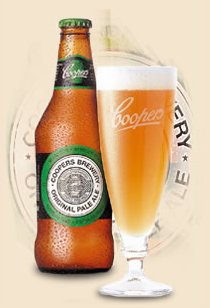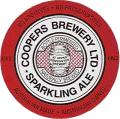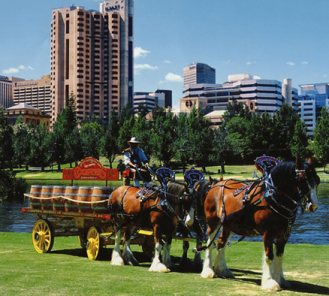| |
Cooper's brewery, Australia
by Willard Clarke , 10/2006
Family brewers in Britain have been falling like tottering drunks and it seems that nothing can stop this once-vibrant sector of the industry heading for the knacker's yard. Gale's, Hardys & Hansons and Ridley's have sold their inheritance to Fuller's and Greene King while, to enormous distress, Young's revered London ales are about to transfer to Charles Wells in Bedford.
The received wisdom of the industry is that there is no way family-owned breweries can be stopped from selling up if the shareholders no longer have the backbone to continue. But, as Batemans, McMullen and Shepherd Neame have shown, family feuds can be overcome and brewing continued if passion rather than cash is the driving force.
Further evidence comes from Australia, where the family-owned Cooper's Brewery in Adelaide has not only beaten off a takeover bid from the giant drinks corporation Lion Nathan but is also enjoying a surge in sales as a result.
The brewery's founder, Thomas Cooper, emigrated with his wife to Australia from Yorkshire in 1852. He was a Methodist lay preacher and disapproved of drinking but his wife was the daughter of an innkeeper and she brewed ale at home. Thomas worked as a shoemaker and a dairyman but turned his hand to brewing when his wife fell ill. His neighbours were impressed with his home brew and encouraged him to set up in business.
He opened a small brewery in 1862 and his success led him to move to bigger premises in the Leabrook area of Adelaide in 1881. When his wife died, he remarried and produced no fewer than 16 children, ensuring a constant supply of recruits to the brewing business.
|
|

|
Remarkably, in a country dominated by such lager brands as Castlemaine XXXX and Foster's, Cooper's remained true to the pale ales and stouts perfected by Thomas. Cooper's Sparkling Ale and Best Extra Stout had a legion of devotees but they remained small brands largely confined to South Australia.
The impact of CAMRA was felt in Australia, however. From the 1980s the beers, Sparkling Ale in particular, became cult brews and were sold more widely on draught and in bottle throughout the country. In 2001, the brewery, run by the fourth and fifth generations of the family, moved to a custom-built new site in the Regency Park neighbourhood of Adelaide.
Along the way, Cooper's abandoned its system of fermentation that was similar to the "double drop" method used by Brakspear. Fermentation started in wooden casks made from jarrah hardwood and the liquid was then dropped down one storey to 108-gallon wooden puncheons where a lively fermentation continued. Now stainless steel conical vessels have replaced the wooden ones and lovers of the beers argue they have lost some of their complexity as a result.

|
|
You can judge the quality for yourselves, as Sparkling Ale (5.8%) and Original Pale Ale (4.5%) are now available in Britain. They are both bottle-fermented beers and proudly proclaim on their neck labels "Real Aussie Ale". Such has been the success of all the beers - Pale Ale is now Cooper's leading brand - that inevitably a marauding shark in the brewing waters moved in for the kill.
|
Lion Nathan is an enormous drinks conglomerate with origins in New Zealand. It grew when it acquired the brewing business of the disgraced Australian entrepreneur Alan Bond. As a result, Lion Nathan now owns Castlemaine, Tooheys, Hahn, Malt Shovel and South Australian Brewing as well as the leading New Zealand brand Steinlager.
The group's belief in the quality of its products can be measured by the decision in the 1990s to launch a new beer called Duff's. Apart from the unintentional irony of the name, the launch led to legal action by 20th Century Fox, owner of the Simpsons: Homer Simpson famously drinks Duff's beer in Moe's bar in Springfield. Lion Nathan dropped the brand. There is even greater irony in the fact that Australian-born media tycoon Rupert Murdoch owns 20th Century Fox.
The Japanese brewery Kirin has bought a 46 per cent stake in Lion Nathan and this giant of the Far East and Australasia turned its sights on Cooper's last year. Cooper's is not listed on the stock market: family members overwhelmingly own the bulk of the shares. So desperate was Lion Nathan to snap up Cooper's - which offers unwanted competition to LN's own South Australian Brewing - that it increased its original offer from $260 per share to $310.
It was tempting bait. The Coopers could have taken the money and retired on the proceeds. But at an Extraordinary General Meeting in December last year, the family shareholders voted by a staggering majority of 93.4 per cent to reject the Lion Nathan bid.
The result has been that Cooper's remains in family hands and its sales have boomed as a result. The brewery's share of the South Australian beer market has grown to 25 per cent, increasing by 10 per cent a year. The brewery is also enjoying astonishing success outside its home state. In the past financial year, nationwide sales have increased by 14 per cent, with growth of 50 per cent in Western Australia and 40 per cent in Queensland.
From this great distance, I salute the Cooper family who have bravely kept the independent brewing flag flying. British family brewers, please take note.
|
|

|
|
|

